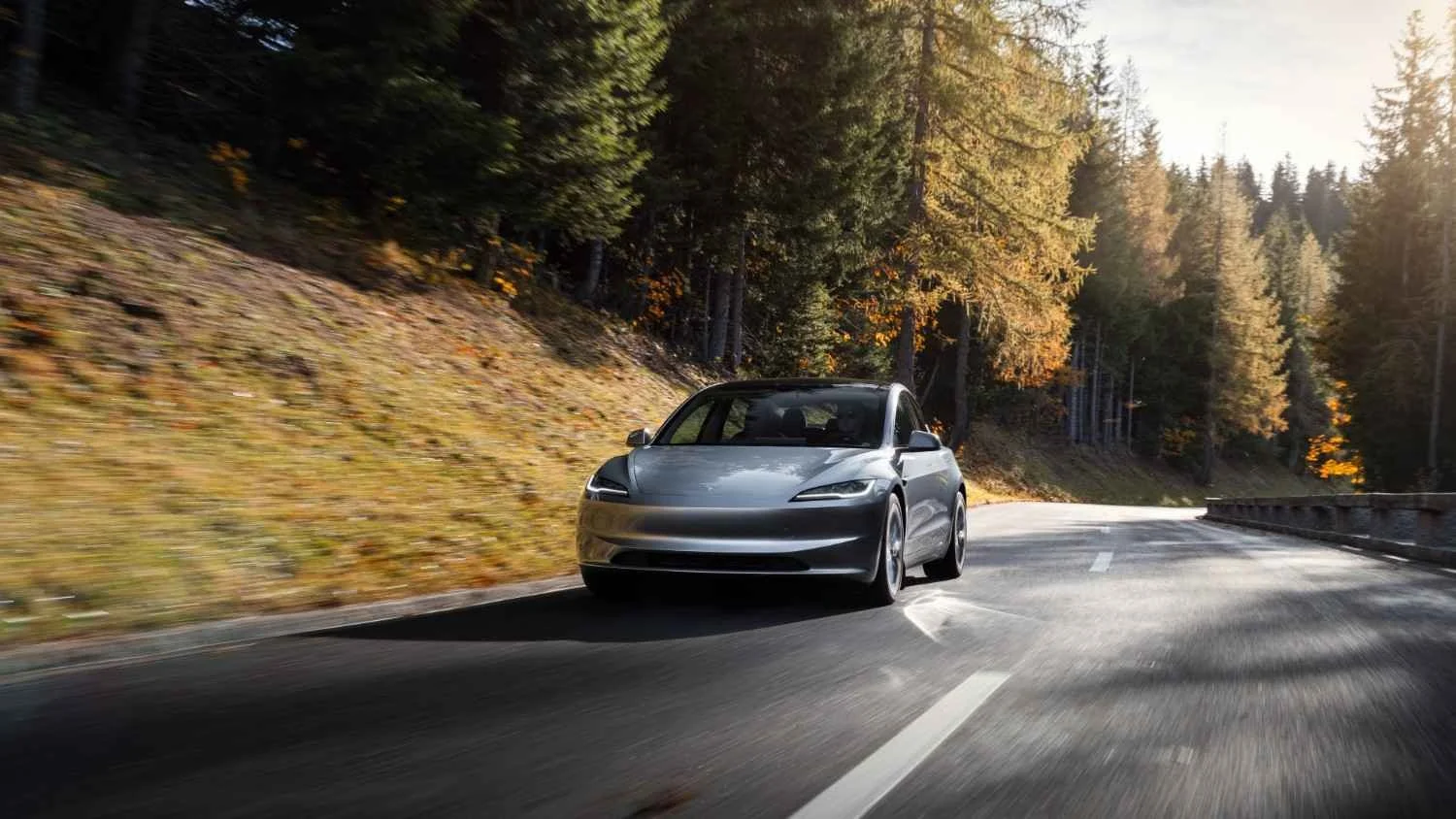Electric Car Benefit in Kind (BiK): Tax Implications and Examples 2025
Key insights:
The Benefit in Kind tax for electric cars remains substantially lower than for petrol/diesel vehicles, with EV BiK rates at just 3% for 2025/26, increasing by 1% annually until 2027, then by 2% annually until capping at 9% in 2029 - significantly below the maximum 39% rate for conventional vehicles.
A direct comparison between similar vehicles demonstrates the dramatic tax advantage of electric cars - a 40% taxpayer would pay just £47 monthly BiK for a Tesla Model Y compared to £458 for a similarly priced BMW 3 Series, a savings of over £400 per month.
BiK calculations follow a simple formula (P11D value × BiK rate × income tax bracket), and understanding this calculation is essential for employees considering salary sacrifice schemes as they evaluate how much they'll actually pay each month after tax benefits.
Update: Following the Autumn Budget on the 26th of November 2025 - the BiK structure remains unchanged, and protected until 2030.
Benefit in Kind (BiK) tax is a tax levied on company benefits given to an employee in addition to their salary.
This topic can be complex, especially when it comes to electric car salary sacrifice. That’s why we’ve made a simple guide on BiK. It explains what it is, the costs involved, and compares electric vehicles (EVs) to traditional petrol cars.
What Is Electric Car Benefit in Kind (BiK)?
Benefit in Kind tax is a tax on employees who receive benefits, like cars, accommodation and loans, on top of their salary. Some company benefits can be tax-free, like childcare. Your employer takes the tax the employee owes from your wages through Pay As You Earn (PAYE).
Here Are Some Important Things To Note About Benefit in Kind And Electric Cars:
HM Treasury establishes the BiK tax rate, and it's generally taken out of your salary through PAYE (pay-as-you-earn),
Selecting a zero-emissions plug-in vehicle (i.e., an electric car) instead of a traditional petrol or diesel car can lead to significant savings,
Currently, the BiK rates make electric cars and efficient plug-in hybrids attractive because the company car tax on electric vehicles is considerably lower.
How Do I Calculate How Much BiK I Owe?
It is easy to calculate how much Benefit in Kind tax you owe by following the formula:
P11D value of the car ✕ the BIK rate ✕ your income tax bracket = BIK tax owed
For example, if an employee is provided with an electric car with a P11D value of £40,000, and electric cars have a BiK rate of 3% for the current tax year, the employee would pay £480 per year if they are a 40% taxpayer (earning between £50,271 and £125,140). This equates to approximately £40 per month.
What Is The Current BiK Rate For Electric Vehicles?
In the 2024 Autumn Statement, Rachel Reeves announced that company car tax rates for electric cars will remain low, with a promise to continue to limit the annual increases by 1% from 2025 to 2028. Under the current, adjusted proposals, BiK will now increase by 1% from 2024 to 2027 - and by 2% in 2028 and 2029.
Here are the key points:
2025/26 Increase: Company Car Tax (Benefit-in-Kind tax) has risen from 2% to 3%,
Future Rates: Increases will continue by 1% annually, reaching 5% by 2027,
In 2027 the BiK rates will then increase by 2% year-on-year - and cap out at 9%.
This is still below the maximum BiK rate of 36% for petrol and diesel cars.
This is in line with the government’s aim to provide long-term certainty for taxpayers and the industry. BiK rates will continue to strongly incentivise EV adoption, while rates for hybrid vehicles will be increased to align more closely with rates for petrol and diesel cars. Reeves announced:
BiK rates for hybrid vehicles or cars with emissions of 1-50g of CO2 per kilometre will rise to 18% in 2028-9 and 19% in 2029-30.
The rates for all other vehicles will increase by 1 percentage point per year to 38% in 2028-29 and 39% in 2029-2030.
The table below shows these changes for different types of cars depending on their CO2 emissions. You can see how much the company car tax scale will increase as time goes on.
| CO2 Emissions (g/km) | Zero Emission Mileage | 2024/25 | 2025/26 | 2026/27 | 2027/28 | 2028/29 | 2029/30 |
|---|---|---|---|---|---|---|---|
| 0 | 2% | 3% | 4% | 5% | 7% | 9% | |
| 1-50 | >130 | 2% | 3% | 4% | 5% | 18% | 19% |
| 1-50 | 70-129 | 5% | 6% | 7% | 8% | 18% | 19% |
| 1-50 | 40-69 | 8% | 9% | 10% | 11% | 18% | 19% |
| 1-50 | 30-39 | 12% | 13% | 14% | 15% | 18% | 19% |
| 1-50 | <30 | 14% | 15% | 16% | 17% | 18% | 19% |
| 51-54 | 15% | 16% | 17% | 18% | 19% | 20% | |
| 55-59 | 16% | 17% | 18% | 19% | 20% | 21% | |
| 60-64 | 17% | 18% | 19% | 20% | 21% | 22% | |
| 65-69 | 18% | 19% | 20% | 21% | 22% | 23% | |
| 70-74 | 19% | 20% | 21% | 21% | 22% | 23% | |
| 75 | 20% | 21% | 21% | 21% | 22% | 23% | |
| 100 | 25% | 26% | 26% | 26% | 27% | 28% | |
| 150 | 36% | 36% | 36% | 37% | 38% | 38% |
What Is P11D For Cars?
The P11D company car value is the vehicle’s list price, including VAT and charges of delivery, excluding registration and tax. The P11D company car value does not change. This is because we only use the P11D which the manufacturer quotes.
UK Benefit in Kind (BiK) - Electric Car Tax Bands & BIK Rates
The tables below illustrate future BiK tax bands based on your vehicle's CO2 emissions.
You can use this information to figure out the company car tax rate that will apply to your vehicle. Alternatively, you can simplify the process by using The Electric Car Scheme quote tool, where we'll handle the calculations for you.
HMRC determines the BIK bands, and they are linked to a vehicle's CO2 emissions. For electric or alternative fuel cars with zero CO2 emissions, a specific rate applies. If you drive a hybrid car emitting less than 50g/km, the rate is determined by its zero-emissions range—the distance it can travel on electric power before needing a recharge.
The government outlined company car tax rates until April 2028 in the 2022 Autumn Statement.
At The Electric Car Scheme, we are working towards an assumption that the BiK rate i will increase by one percentage point year-on-year to 5% in 2027, and switch to a 2% increase in the two subsequent years, capping out at 9% in 2029.
Income Tax Rates And Bands
The amount of Income Tax you pay each tax year is determined by two main factors:
The portion of your income that exceeds your Personal Allowance.
The segments of your income that fall into each tax band.
The table below shows the tax rates you pay in each band if you have a standard Personal Allowance of £12,570.
| Band | Taxable income | Tax rate |
|---|---|---|
| Personal Allowance | Up to £12,570 | 0% |
| Basic rate | £12,571 to £50,270 | 20% |
| Higher rate | £50,271 to £125,140 | 40% |
| Additional rate | over £125,140 | 45% |
How Much Electric Car BIK Tax Do You Pay?
Below are some examples of some of the most popular electric cars and how much benefit-in-kind tax you can expect to pay:
Tesla Model 3 RWD from £560 per month with electric car salary sacrifice
Note: Pricing shown is based on data collected from The Electric Car Scheme quote tool. All final pricing is inclusive of VAT. All prices above are based on the following lease terms; 10,000 miles pa, 36 months, 40% tax rate payer and are inclusive of Maintenance and Breakdown Cover.
If you decide to use The Electric Car Scheme to lease a Tesla Model Y, you'll pay £609 each month. By doing this, you'll save £379 in income tax and £19 in national insurance. However, you'll need to pay £60 towards Benefit in Kind (BIK). It's essential to know that BIK taxes have been high in the past, reducing the benefits.
MG4 Long Range 64kWh from £285 per month with electric car salary sacrifice
If you choose to salary sacrifice the Kia EV6, your monthly cost will be £700. This means you save £425 on income tax and £21 on national insurance. You will have to pay £85 in BIK tax to pay each month.
For leases spanning into 2028/9, we (at The Electric Car Scheme) are working an assumed BiK rate of 7% for 2028/29, increasing by 2 percentage points into 2029. This will impact our customers' take-home pay according to the actual BiK rates determined.
BIK Comparison Of An Electric Car Vs a Petrol Car From April 2025
| Vehicle | Tesla Model Y Long Range RWD | BMW 3 Series M Sport |
|---|---|---|
| P11D Value | £46,935 | £43,000 |
| 0-60 mph | 5.7 seconds | 4.2 seconds |
| Emissions | 0 gCO2 /km | 270 gCO2 /km |
| 2025/25 Monthly BiK Cost | £47 per month | £458 per month |
We've compared the tax you pay for having an electric car, like the Tesla Model Y Long Range RWD, with a high-performance petrol car, the BMW 3-series M Sport. They're similar in price and speed.
The Tesla Model 3 is fully electric, so it doesn't produce any emissions, while the BMW 3-Series emits 270g of CO2 per kilometre. Because of this, the tax you pay for the Tesla is less than what you'd pay for the BMW. And keep in mind, this comparison doesn't even consider the monthly leasing costs for these cars - highlighting why EV salary sacrifice is a great way to save money on the cost of your car.
What Are The Company Car BIK Rates?
As of 2025, company car tax rates in the UK have been determined by the environmental impact of the cars. Here's a breakdown:
Petrol & Diesel Cars
Petrol and diesel cars that meet specific emission standards begin with a tax rate of 23% for the 2025/26 tax year,
This rate increases by 1% for each additional 5 grams of CO2 emitted per kilometre, but it does not exceed 37%,
However, since April 2018, an additional 4% diesel surcharge has been levied on diesel cars that do not meet Real Driving Emissions Step 2 (RDE2) standards (many diesel cars still fall into this category). The total tax rate, even with the surcharge, cannot exceed the 37% cap.
In the Autumn Budget, Rachel Reeves announced the rates will increase by 1 percentage point per year to 38% in 2028-29 and 39% in 2029-2030.
Hybrid Cars
Hybrid cars generally have lower CO2 emissions, resulting in reduced tax rates.
Most hybrid cars benefit from a tax rate at least 2% lower than regular petrol or diesel cars.
Importantly, diesel hybrids are exempt from the 4% diesel tax, as they are considered "alternatively fueled vehicles" for tax purposes.
BiK rates for hybrid vehicles or cars with emissions of 1-50g of CO2 per kilometre will rise to 18% in 2028-9 and 19% in 2029-30.
Electric Cars
Electric vehicles (EVs) continue to enjoy the lowest BIK tax rates.
For the 2025/26 tax year, the BIK rate for electric cars is at 3%, offering significant savings compared to petrol, diesel, or even hybrid cars. This will however increase to 4% from April 2026.
The BiK rate for electric vehicles will increase by 2 percentage points per year in 2028-29 and 2029-30, rising to 9% in 2029-30.
What Do We Think About EV BiK Tax At The Electric Car Scheme?
Thom Groot, CEO & Co-Founder of The Electric Car Scheme, said the certainty was useful but a longer period of lower taxes would help to spur more people into electric cars.
“Before the Autumn Statement of 2024, we had no clarity on whether the BIK rate would stay at 2% or make a huge jump to 25%. Now we know it will rise by 1% every year from 2025, topping out at 9% in 2029.”
This clarity is key as much of the company car market is made up of three or four-year leases – meaning the uncertainty was stopping people from making the right choice and getting into a clean company car. At The Electric Car Scheme, we are working on an assumption that in 2028/9 this will increase to 6% and by a percentage point incrementally year-on-year.”
“Growing the electric company car market is good for everyone because today’s company cars are tomorrow’s second-hand vehicles.“
“We do understand the need to charge road tax from electric car owners to keep roads maintained (we all use them after all), so are not against the move to increase VED rates.”
How Does BiK Work At The Electric Car Scheme?
In The Electric Car Scheme’s case, the company benefit we provide is a brand new, heavily discounted electric car. From HMRC’s perspective, this is different or supplementary to your gross salary and so you have to pay BiK tax because you are receiving an additional benefit.
To determine the tax liability associated with having an electric car through The Electric Car Scheme, please use our online calculator available here. We facilitate the leasing of any electric car and provide a tool to help you calculate the savings on employee tax and National Insurance, as well as the BiK tax owed.
Are you an employer?
BOOK A DEMOAre you an employee?
SEE AVAILABLE CARSYou might also like:
Our pricing is based on data collected from The Electric Car Scheme quote tool. All final pricing is inclusive of VAT. All prices above are based on the following lease terms; 10,000 miles pa, 36 months, and are inclusive of Maintenance and Breakdown Cover. The Electric Car Scheme’s terms and conditions apply. All deals are subject to credit approval and availability. All deals are subject to excess mileage and damage charges. Prices are calculated based on the following tax saving assumptions; England & Wales, 40% tax rate. The above prices were calculated using a flat payment profile. The Electric Car Scheme Limited provides services for the administration of your salary sacrifice employee benefits. The Electric Car Scheme Holdings Limited is a member of the BVRLA (10608), is authorised and regulated by the FCA under FRN 968270, is an Appointed Representative of Marshall Management Services Ltd under FRN 667174, and is a credit broker and not a lender or insurance provider.
Last updated: 26/11/2025







